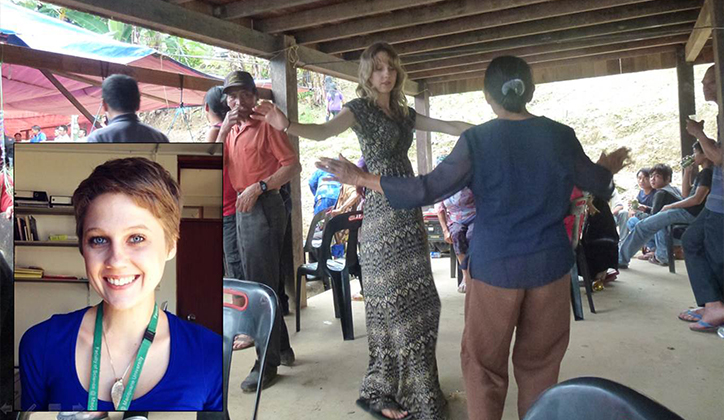We’re profiling nominees in the lead up to the 2014 Macquarie University Research Excellence Awards on Thursday 2 October.
This week meet PhD candidate Laura Hammersley from the Department of Environment and Geography, who is a nominee for an Excellence in Higher Degree Research – Social Sciences, Business and Humanities Award.
How long have you been a researcher at Macquarie?
I have been a student and researcher at Macquarie for nine years. I started my PhD in the Department of Environment and Geography in November 2010. Prior to this I completed my undergraduate degree in Environmental Management in 2008, and my Honours degree in Human Geography in 2009, both at Macquarie.
I was drawn to research because…
My research journey began when I decided to volunteer overseas for a short period of time after completing my undergraduate degree, as a way of practically experiencing ‘development’ beyond the walls of the university and confines of a textbook. As a volunteer tourist, I spent three months living, learning and working in a local village on a remote island in Northern Vanuatu, facilitated by an Australian-based volunteer organisation. As a volunteer however, I found myself presenting to a number of local youth about life skills within a community, culture, and language for which I had no knowledge or experience. What gave me the right as a young Western female to intervene and lecture a cohort of youth about how they should behave in their own village and respect their elders? This experience led me to critically question through research the role of civic participation in the community development industry. I wanted to explore the potential for such community-engagement initiatives to contribute to a development agenda based on mutual learning, understanding, and relationship-building as opposed to a one-way interventionist charity model that sees unexperienced outsiders doing for communities rather than with. My honours and PhD research has enabled me to collaborate ethically with diverse peoples and communities and draw on their expertise to inform the international volunteer for development industry as well as to shed light on broader issues of social justice.
What would be an ‘elevator pitch’ of your research area?
Over the past decade there has been a proliferation of organisations, including Higher Education institutions, offering unskilled and semi-skilled individuals the opportunity to participate in short-term social, environmental, economic and community development initiatives, particularly in so called ‘developing’ country contexts. My research works with, and focuses on, the perspectives of Indigenous community-based organisations in Sabah, Borneo and the Northern Territory who host undergraduate students through the Macquarie University Professional and Community Engagement (PACE) initiative to ensure that such community engagement is both ethical and reciprocal.
In layman’s terms, what is the wider impact of your research?
University-based community engagement programs seek to provide a sustainable reciprocal form of education that is mutually beneficial to host communities and student groups. Most of the current research focuses on student learning objectives, which means that little is known about community development outcomes and how to support them. This research fills this gap by paying critical scholarly attention to the motivations, intentions, and outcomes of programs from the community perspective, whilst collaboratively evaluating their program experiences in light of their broader organisational objectives. The process enables community partners to guide the student learning and engagement process and contribute to ongoing project monitoring and evaluation. This will ensure that participation activities are based on reciprocal learning and engagement and can adequately consider their desires and priorities. In addition to the scholarly contribution of community partner insights, these findings will be fed back into the PACE program and contribute towards the development of stronger partnerships based on mutual respect and joint ownership, and the capacity of community partners to achieve their objectives.
My favourite and/or most proud research moment was when…
I had the privilege of living in an Indigenous community in Sabah, Borneo for a total of five months and was invited to a family reunion in the neighbouring state of Sarawak for three days. It had been more than 25 years since any family member from either Sabah or Sarawak had connected, with most having never had the chance to meet before. When my host family and I arrived there was a roar of excitement within the communal longhouse that was filled with family relatives and their children. As we gradually migrated from room-to-room, each family shared Indigenous beadwork and weaponry, old photos, and stories accompanied by tears and laughter. That night, myself and the other Sabahan family members were dressed up in traditional Sarawak costume. Everyone from the longhouse had squeezed into the one room to take photos as we danced the Kadazan/Dusun traditional ethnic dance – the Sumazau. Together we continued to dance for hours to Indigenous Sarawak and Sabahan pop idols until we fell asleep on the very spot our feet had made their final dance steps the night before. This experience represents one of many defining moments that shifted the way I view and value fieldwork and my role not only as a researcher, but as a guest, a learner, and a family member. Having been accepted into people’s communities, cultures, families, and in some cases their hearts, these moments encapsulate the personal, emotional, and people filled reality of undertaking prolonged fieldwork that seemingly operate outside of the research process but are in fact intimately connected to it.

